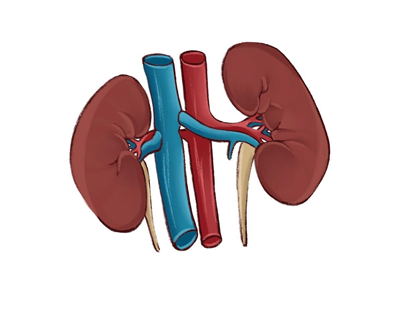Did you know that back pain, doesn’t always come from your “back”?
While many cases of back pain can be attributed to your back structures, there are cases where issues with internal organs can be perceived as back-pain. The organs most commonly responsible for this unique situation are by far your kidneys!
Anatomy & Function
Our bean-shaped kidneys are essential organs each made up of ~1,000,000 tiny structures referred to as “nephrons”. These nephrons are responsible for ‘sorting through’ our circulatory system’s blood, filtering out waste products to be eliminated and keeping beneficial ions/water within our body. The waste products are then condensed & stored in the bladder until nature next calls.
Kidney Issues resulting in perceived back pain
Kidney pain (and resultant back/flank pain as shown above) can occur for any number of reasons. Two of the more common causes kidney stones, or infections. If these kidney issues can cause back pain as a symptom, then how do we differentiate between mechanical back-pain, and kidney-referred back pain?

Kidney-referred back pain is often felt higher-up, and deeper than true, mechanical (low) back pain. It may be felt on both sides, underneath your rib cage. Kidney pain is also often constant, without much relief being provided by changing of your position.
Other signs that your back pain is mechanical include flare-ups during certain activities/movement (like bending forward), relief with rest, muscle aches, and potential ‘shooting’ down a leg. However, indications of potential more-serious kidney issues include fever, full-body aches and significant fatigue.
Ultimately, treatment of your kidney pain is dependent on the exact diagnosis of your kidneys. Your chiropractor is able to differentiate mechanical & kidney-referral based back pain, and exact diagnosis can be made through urinalysis & imaging such as ultrasound or a CT scan.
Permanent Kidney Damage
When kidney-related issues remain unchecked, damage to the tiny nephrons within our kidneys may occur. This damage is often permanent.
The integrity of our kidneys is measured by their current level of function. “Glomerular Filtration Rate” – shortened to GFR – is the term used when testing and observing kidney function. The true test for GFR is complex, requiring ingestion of a chemical which is then looked for in passing urine. The alternative is a relatively accurate estimation through looking at levels of a molecule called “creatinine” within the bloodstream.
GFR is typically seen on a range from greater than 90 (considered to be “normal”, or high-functioning) to less than 15 (considered kidney failure). The lower your GFR number, the more compromised your kidneys are. A patient’s GFR may fall based on a variety of factors, including normal aging, stress, poor diet, lack of exercise, trauma, infection etc.
As a patient’s GFR falls, a doctor would recommend diet modification around avoiding foods high in molecules considered ‘difficult’ for the kidney to filter – specifically Sodium, Potassium & Phosphorus – alongside moderate amounts of cardiovascular exercises.
Kidney-friendly diet ideas
The best diet is one that you can stick to! That being said, in the case of kidney health there are definitely “eats” and “try-not-to-over eats”. Firstly, make efforts to limit your salt intake! Read the label on purchased goods, avoid cooking with salt, and when eating out request no added salt to your meal.

Limit your consumption of: dark sodas, processed meats, bananas, avocados, oranges/orange juice, cured/pickled foods, potatoes, rice, snacks like chips/pretzels/crackers, red meats, chicken skin. Something to note is that some of these “limit” foods include foods that are otherwise healthy and nutritious. However, people on a kidney-cautious diet should know that many healthy food choices are high in elements that they should limit – such as potassium in bananas.
Consider including: Cauliflower, blueberries, cranberries, skinless chicken breast, cabbage, bell peppers, arugula, pineapple, shitake mushrooms, sea bass, egg whites, garlic, olive oil, onions. These foods can be considered to be lower in levels of potassium & phosphorus (while still containing some, ofcourse).
Conclusion
Our kidneys are our friends! They are essential to filtering our blood and education regarding maintaining their health can prolong an active, healthy lifestyle. The most direct method to maintaining kidney health is diet modification – be sure to consult with a registered health practitioner when creating a diet plan right for you!






